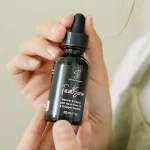As pointed out last year in a review of pollen extract for prostate support, benign prostatic hyperplasia (BPH, formerly called hypertrophy), involves a renewed growth in the number of prostate cells late in life.1 Unfortunately, of men between the age of 40 and 59, nearly 60 percent can be shown to already be suffering from benign prostatic hyperplasia. This usually does not present a noticeable problem until after the age of 50; by the age of 80, however, some 85 percent of all men suffer from one or more symptoms of BPH. The primary effect of BPH is a progressive decrease in the ability to empty the bladder as the prostate enlarges and applies pressure to the urethra.
BPH is hardly the lone prostate and sex hormone related issue that can be troubling to men. Aside from prostate cancer, which for most men is so slow growing as to not be life threatening, many men are concerned about low testosterone, which has its own repercussions. Two of the repercussions of low testosterone are a low level of muscle-maintaining free testosterone and elevated levels of estrogen produced from testosterone by a pathway referred to as the aromatase pathway. Fortunately, there are a number of safe natural compounds that can help to regulate both sides of this equation.
Protective herbs and nutrients have counterparts that increase the risks of various conditions. Some of these potentially damaging compounds are prescriptions given for unrelated conditions and this provides a rationale for being cautious about prescription drugs. What you do not know definitely can hurt!
PROTECTIVE AND SUPPORTIVE NUTRIENTS AND HERBS
Omega-3s
In 2013, experts slammed a claimed fish oil/omega-3 fatty acid intake link to prostate cancer as “scaremongering.” The trial in question purported to find increased risks for total prostate cancer as well as increased risks of both low-grade and high-grade prostate cancer, an increase of 71 percent in this latter category.2 The responses were quick and brutal. One nutritionist (Duffy MacKay, vice president of scientific and regulatory affairs at the for Responsible Nutrition (CRN)) pointed out, quite correctly, that the findings of this study were based on blood level differences so small that “[t]his change [of 0.2%] literally could have occurred if somebody ate a fish sandwich on their way to get their blood drawn.”3 Both the consumers of the low and the high levels of long chain omega-3 fatty acids were within the normal blood range.
Others pointed out that the findings of the study clearly imply that men in countries with high levels of consumption of seafood, such as Scandinavia and Japan, should exhibit high levels of prostate cancer, yet the opposite is the case. Alan Ruth, PhD, CEO of the Irish Health Trade Association observed, “[i]n a 2010 meta-analysis of 31 studies published in the American Journal of Clinical Nutrition, the risks of prostate cancer diagnosis calculated for high fish consumption ranged from a 61% decrease in risk to a 77% increase in risk, and several showed no significant differences in risk at all…In the same meta-analysis, pooled data from four studies on fish consumption and death from prostate cancer (rather than diagnosis of prostate cancer) found a 63% decrease in risk for high fish consumption.”4
Especially interesting in this dust-up is the recent attempt to rehabilitate omega-6 fatty acids. In pre-modern times, the intake of omega-3 to omega-6 fatty acids in the diet typically was in the range of one-to-two, whereas today in the United States it regularly may be as low as one-to-twenty-five, with prostate cancer rates climbing steadily over the last 60 years. In this instance, a headline is revealing: “Corn oil, omega-6 could speed up prostate cancer.”5 Journal article titles are more prosaic, yet just as damning: “A high ratio of dietary n-6/n-3 polyunsaturated fatty acids is associated with increased risk of prostate cancer.”6
Barry Sears, who has written for years on the health effects of fatty acids, both good and bad, tartly comments in his blog, “Omega-3 fatty acids and prostate cancer? Oh, really?”7 Among other things, Sears demonstrates how easily a statistically significant blood reading of fatty acid profiles can be attached to otherwise clinically irrelevant findings. The take away message in this case is that the experience around the world repeatedly has been that prostate risks, especially death from prostate cancer, are lower in matched populations that consume more fish. There is nothing in recently published research that should make us doubt that improving the omega-3 to omega-6 ratio in our diets is a good goal at which to aim.
Grape Skin Extract & Resveratrol
In many areas in the US and the United Kingdom (Scotland has not yet opted out of the Union), one cannot visit a doctor without being queried about alcohol intake and then the required lecture on the evils of alcohol. The distinction as to the source of alcohol in the diet routinely drops out despite the fact that red wine has been recognized in Europe for centuries as exhibiting various health benefits and little downside as long as consumed in moderation. It turns out that red wine, often thought of in terms of the heart, may benefit the prostate, as well.
The trick to the studies is that the researchers must work vigorously to screen for the different sources of alcohol over the course of a man’s life. If this is done, then the research is likely to confirm that a glass of red wine per day may be protective against the risk of prostate cancer.8 Less clear is which compounds in red wine are protective. Perhaps many are. A recent study on grape skin extract and resveratrol identified several protective mechanisms of action.9 Some of the factors linked to resveratrol have been known for years, whereas other mechanisms and, similarly, the benefits of other red wine compounds, are being vigorously researched. Grape seed components (proanthocyanidins) are another example of a source of anti-cancer benefits.10 Given the huge volume of papers being published today on the health-protective benefits of red wine and its ingredients, it is a reasonable conclusion that most men may benefit from one or two glasses of red wine per day consumed with meals.
Quercetin & EGCG
The dietary bioflavonoid quercetin is well known to readers of this magazine, as is epigallocathechin gallate (EGCG). Both compounds are considered to be health protective and quercetin, in particular, is known to improve the uptake (bioavailability) and the benefits of many other compounds found in the diet and in herbs. Papers routinely show greater efficacy or even benefits where none initially were found, when quercetin is combined with resveratrol, with sulphorafane, with EGCG, etc. One of the more interesting recent findings is that these combinations sometimes not only can help to prevent the transformation of cells from precarcinogenic stages to active cancer, but also can interfere with or eliminate entirely cancer stem-cell characteristics. Cancer stem cells are the ultimate source of cancer self-renewal, so this action by the combination of quercetin and EGCG is a warm recommendation.11
Bitter Melon
Bitter melon has received quite a bit of publicity recently with regard to pancreatic cancer. It would be unfortunate were the exploration to end there. Several researchers have reported that treatment of bitter-melon-related products in a number of cancer cell lines induces cell cycle arrest and apoptosis without affecting normal cell growth.12 Researches targeted specifically at prostate cancer have demonstrated that the impact of bitter melon extends to this area.13 Admittedly, bitter melon is not a staple at the American table. Perhaps that should change. See my earlier article, “Going WILD with Bitter Melon for Blood Sugar Support.”14
Pomegranate
Pomegranate is a fruit long associated with healing and medicine. Indeed, the pomegranate is on the crest-of-arms of the British Royal Society of Medicine and of many other ancient organizations devoted to healing. A quick look at the PubMed database shows that the keywords “pomegranate” and “prostate” bring up 60 studies. Many of these studies have been promising, especially when pomegranate was added to other ingredients with related and differing mechanisms of action. For instance, in 2013 the polyphenol rich whole food supplement Pomi-T® (pomegranate seeds, green tea, broccoli, and turmeric) was reported to have a direct anti-cancer effect in men with prostate cancer.15 These results were confirmed in a larger clinical trial published in 2014.16
Thymoquinone and Black Seed
Few Americans have heard either of black seed or thymoquinone (TQ). The former is famous for healing in the areas in which it grows naturally, meaning much of the eastern Mediterranean through the Near and Middle East all the way to India. Mohammed is reputed to have said that the seed cures every condition except death itself.
With regard to the prostate, black seed is useful for both BPH and in preventing prostate cancer induction. One of the important ingredients in black seed oil, thymoquinone, promotes healthy apoptosis in prostate cells and therefore helps the body to regulate the size and health of the prostate.17,18 Similar effects have been found in, for example, breast cancer, so TQ has a broad spectrum of applications.19
Cactus Flower
A couple of decades back, the herbal extract chrysin was introduced to the athletics and body building world as an answer to improving free testosterone levels and reducing the pathway (aromatase) that transforms testosterone to estrogen. Chrysin has some benefits, as long as one does not expect too much and is willing to focus on the anxiolytic qualities of the compound (found in passion flower). However, much more successful compounds for this purpose of increasing free testosterone, and so forth, have been found. One of these is an extract of cactus flower (Opuntia ficus-indica).
I ran across this almost a decade ago being sold in Germany and Israel for BPH,20 but at the time could not find a reliable source of supply. Since then, a friend with whom I was working took this item and continued to dig until he found a reliable source that he could market as increasing serum free testosterone levels and reducing aromatase (reducing estrogen production and inhibiting the binding of dihydrotestosterone/DHT.) As my friend writes at his website, based on preliminary laboratory research, “Opuntia flower extract (1 mg/ml concentration) inhibited over 80% of the activity of 5-alpha reductase in human prostate tissue homogenate and inhibited over 80% of aromatase activity in human placenta tissue homogenate.”21 This particular product also contains supporting ingredients, such as an extract of stinging nettle root.
Some Prostate-Questionable Foods and Pharmaceuticals Now for a few items that men may want to remove from their daily habits or environment.
- Non-and low-fat milk (but not whole milk or other dairy products) intake by men is linked to higher rates of prostate cancer22
- Long-term use of statins increases the risk of prostate cancer23
- Oral contraceptive use is associated with prostate cancer—this refers to these contraceptives getting into the environment at large and not to use by one’s partner24
Conclusion
There are protective foods, nutrients and herbs of which men should take advantage to maintain and regain prostate health as well as improve other parameters of health and performance. Omega-3 fatty acids and the active compounds found in red wine (grape skin anthocyanidins and other compounds, resveratrol, grape seed proanthocyanidins, quercetin), green tea (EGCG) and bitter melon are on this short list. More exotic are black seed and thymoquinone as well as cactus flower extract. For the most part, these can be characterized as special foods since they can be consumed over the long term and have few or no downsides even when consumed chronically in large amounts. Indeed, this should be the goal—a little prevention is always worth a whole lot of cure.
References
-
-
- F. Hinman, Benign Prostatic Hypertrophy. New York: Springer-Verlag, 1983.
- Brasky TM, Darke AK, Song X, Tangen CM, Goodman PJ, Thompson IM, Meyskens FL Jr, Goodman GE, Minasian LM, Parnes HL, Klein EA, Kristal AR. Plasma phospholipid fatty acids and prostate cancer risk in the SELECT trial. J Natl Cancer Inst. 2013 Aug 7;105(15):1132– 41. doi: 10.1093/jnci/djt174.
- Experts slam omega-3 link to prostate cancer as overblown ‘scaremongering.’ http://www.nutraingredients.com/content/view/print/796071
- Ibid.
- http://www.foodnavigator-usa.com/news/printNewsBis.asp?id=65537
- Williams CD, Whitley BM, Hoyo C, Grant DJ, Iraggi JD, Newman KA, Gerber L, Taylor LA, McKeever MG, Freedland SJ. A high ratio of dietary n-6/n-3 polyunsaturated fatty acids is associated with increased risk of prostate cancer. Nutr Res. 2011 Jan;31(1):1–8. doi: 10.1016/j.nutres.2011.01.002.
- http://zonediet.com/blog/2013/07/
- A glass of red wine a day keeps prostate cancer away?
- Hudson TS, Hartle DK, Hursting SD, Nunez NP, Wang TT, Young HA, Arany P, Green JE. Inhibition of prostate cancer growth by muscadine grape skin extract and resveratrol through distinct mechanisms. Cancer Res. 2007 Sep 1;67(17):8396–405.
- Raina K, Singh RP, Agarwal R, Agarwal C. Oral grape seed extract inhibits prostate tumor growth and progression in TRAMP mice. Cancer Res. 2007 Jun 15;67(12):5976-82.
- Tang SN, Singh C, Nall D, Meeker D, Shankar S, Srivastava RK. The dietary bioflavonoid quercetin synergizes with epigallocathechin gallate (EGCG) to inhibit prostate cancer stem cell characteristics, invasion, migration and epithelial-mesenchymal transition. J Mol Signal. 2010 Aug 18;5:14. doi: 10.1186/1750–2187–5–14.
- Nerurkar P, Ray RB. Bitter melon: antagonist to cancer. Pharm Res. 2010 Jun;27(6):1049–53. doi: 10.1007/s11095–010–0057–2.
- Ru P, Steele R, Nerurkar PV, Phillips N, Ray RB. Bitter melon extract impairs prostate cancer cell-cycle progression and delays prostatic intraepithelial neoplasia in TRAMP model. Cancer Prev Res (Phila). 2011 Dec;4(12):2122–30. doi: 10.1158/1940–6207.
- TotalHealth Online: Going Wild With Bitter Melon for Blood Sugar Support
- Goodman A. High Marks for Nutritional Supplement in Patients with Localized Prostate Cancer. Value-Based Cancer Care. September 2013 Vol 4, No 7.
- Thomas R, Williams M, Sharma H, Chaudry A, Bellamy P. A doubleblind, placebo-controlled randomised trial evaluating the effect of a polyphenol-rich whole food supplement on PSA progression in men with prostate cancer-the UK NCRN Pomi-T study. Prostate Cancer Prostatic Dis. 2014 Mar 11. doi: 10.1038/pcan.2014.6.
- Kaseb AO, Chinnakannu K, Chen D, Sivanandam A, Tejwani S, Menon M, Dou QP, Reddy GP. Androgen receptor and E2F-1 targeted thymoquinone therapy for hormone-refractory prostate cancer.Cancer Res. 2007 Aug 15;67(16):7782–8.
- Kumar AP, Sethi G, Tan KH. Thymoquinone: potential cure for inflammatory disorders and cancer. Biochem Pharmacol. 2012 Feb 15;83(4):443–51. doi: 10.1016/j.bcp.2011.09.029.
- Rajput S, Kumar BN, Sarkar S, Das S, Azab B, Santhekadur PK, Das SK, Emdad L, Sarkar D, Fisher PB, Mandal M. Targeted apoptotic effects of thymoquinone and tamoxifen on XIAP mediated Akt regulation in breast cancer. PLoS One. 2013 Apr 17;8(4):e61342. doi: 10.1371/journal.pone.0061342.
- Palevitch D., Earon G., Levin I., Treatment of benign prostatic hypertrophy with Opuntia ficus-indica (L.) Miller. Journal of herbs, spices & medicinal plants. J. herbs spices med. plants 1993;2(1):45–49.
- http://cleanmachineonline.com/science/how-it-works/ drawing upon Jonas A, Rosenblat G, Krapf D, Bitterman W, Earon G, Neeman I. Efficacy of cactus flowers miller treatment in benign prostatic hyperplasia due to inhibition of 5a reductase activity, aromatase activity and lipid peroxidation. HerbaMed paper; undated.
- Park SY, Murphy SP, Wilkens LR, Stram DO, Henderson BE, Kolonel LN. Calcium, vitamin D, and dairy product intake and prostate cancer risk: the Multi-ethnic Cohort Study. Am J Epidemiol. 2007 Dec 1;166(11):1259–69.
- Chang CC, Ho SC, Chiu HF, Yang CY. Statins increase the risk of prostate cancer: a population-based case-control study. Prostate. 2011 Dec;71(16):1818–24. doi: 10.1002/pros.21401.
- Margel D, Fleshner NE. Oral contraceptive use is associated with prostate cancer: an ecological study. BMJ Open. 2011 Nov 14;1(2):e000311. doi:10.1136/bmjopen–2011–000311.
-











